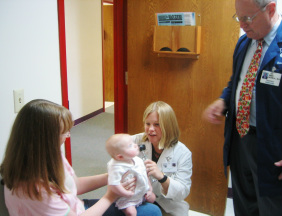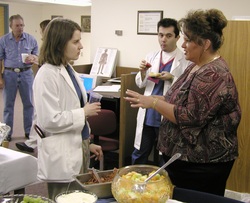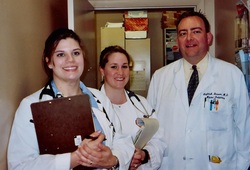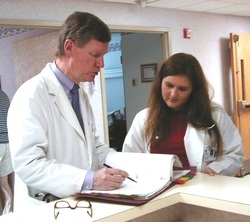Clinical Rotations for Health Professions Students
The NC AHEC coordinates the placement of health professions students from the University of Kentucky, University of Louisville and University of Pikeville College of Osteopathic Medicine in off campus clinical education experiences. These rotations take place in private practices, area hospitals and community health centers. Area physicians and health professionals serve as community-based faculty during these rotations supervising, teaching and guiding students/residents through the clinical experience. Clinical sites that are located in a rural or urban underserved area qualify for the AHEC stipend from UK or U of L (see information below regarding housing and food stipends).
The NC AHEC coordinates the placement of health professions students from the University of Kentucky, University of Louisville and University of Pikeville College of Osteopathic Medicine in off campus clinical education experiences. These rotations take place in private practices, area hospitals and community health centers. Area physicians and health professionals serve as community-based faculty during these rotations supervising, teaching and guiding students/residents through the clinical experience. Clinical sites that are located in a rural or urban underserved area qualify for the AHEC stipend from UK or U of L (see information below regarding housing and food stipends).

Health professions students from other Kentucky colleges and universities will be accommodated whenever possible.
- Clinical rotations in the NC AHEC service area are to be arranged by the NC AHEC Clinical Coordinator in collaboration with the college departmental coordinators.
- All clinical rotations require a minimum of 10 business days to set up and arrange. Most hospitals now require extensive credentialing information which takes time to process.
- Students are not to contact preceptors directly to set up a rotation. Preceptors often work with students from multiple institutions and rely on the AHEC to facilitate the scheduling of students.
- If a student arranges a clinical rotation without consulting the NC AHEC Clinical Coordinator or the college departmental coordinator, the NC AHEC cannot be responsible for assisting with the credentialing or other issues that may arise during the rotation.

- Prior to the rotation please be sure that a FACT SHEET has been filled out. FACT SHEETS may be obtained at UK and U of L’s website. The FACT SHEET contains information about the upcoming rotation, including the dates, location, preceptor, and housing request information.
- Students should bring a copy of their immunization record, driver’s license, and student ID/name tag with them on rotation.
- Stefka Zilberg, Clinical Education Coordinator – will provide other required credentialing information as needed. Stefka is the contact person for questions related to the rotation or housing. She can be reached at 859-442-1192 or stefka.zilberg@kctcs.edu

Housing and travel stipends for UK and U of L students:
UK and U of L health profession students may receive financial support for their AHEC rotation if the rotation site is located in a rural or urban underserved area.
UK and U of L health profession students may receive financial support for their AHEC rotation if the rotation site is located in a rural or urban underserved area.
- Students may arrange their own housing or request that the NC AHEC make arrangements for them.
- Housing in the NC AHEC utilizes private homes. Our priority is to provide the student with the best housing accommodations accessible to the site. Spouses, significant others, children and pets cannot be accommodated.
- Students will have a private bedroom, bathroom, and access to the kitchen. Internet access is available.
- Students staying with family are not eligible for the rent stipend.
- No pets are allowed in NC AHEC housing.
- No smoking is allowed in NC AHEC housing.
- UK students receive $100/week for housing from the UK AHEC office in Lexington. Students must complete the AHEC rent receipt form and have the housing host sign the form.
- U of L students will receive a flat rate stipend of $400 for housing prior to the start of their rotation from the financial aid office. The stipend is disbursed via the student’s Higher One Card.
- If UK or U of L students choose not to accept the housing assigned to them, it will be the responsibility of the student to notify Stefka Zilberg at the NC AHEC office. This must be done at least two weeks prior to the beginning of the rotation.
- UK students are reimbursed for mileage based on the distance from the student’s hubsite to the location where the rotation takes place. This stipend will be received at the end of the rotation.
- U of L students will be reimbursed for mileage based on the distance traveled from Louisville to their rotation site. This stipend will be received at the end of the rotation.

How to apply for reimbursements:
University of Kentucky students:
Contact Lisa Hatten at the UK AHEC Central Office
AHEC Student Services Coordinator
138 Leader Avenue, Room 144
Lexington, KY
859-323-8013
[email protected]
University of Louisville students:
Contact Tracey Gray at the U of L AHEC Central Office
500 S. Preston Street
Instructional B Building
Louisville, KY
502-852-1373
[email protected]
University of Kentucky students:
Contact Lisa Hatten at the UK AHEC Central Office
AHEC Student Services Coordinator
138 Leader Avenue, Room 144
Lexington, KY
859-323-8013
[email protected]
University of Louisville students:
Contact Tracey Gray at the U of L AHEC Central Office
500 S. Preston Street
Instructional B Building
Louisville, KY
502-852-1373
[email protected]

The off campus rotation will provide you with a one-to-one teaching relationship with a community-based faculty member usually in a more independent practice. Many factors such as the personality of the preceptor, training, culture and local resources determine how health care is provided in a community. An AHEC off-site rotation gives the student or resident an opportunity to compare health care delivery and practices in different areas of the state.
We hope your rural or urban-underserved rotation will positively influence your decision about where and how to practice your profession, especially as it relates to rural and/or urban underserved sites. By living and working in a community you will obtain a better understanding of community needs as they relate to your profession.
We hope your rural or urban-underserved rotation will positively influence your decision about where and how to practice your profession, especially as it relates to rural and/or urban underserved sites. By living and working in a community you will obtain a better understanding of community needs as they relate to your profession.
